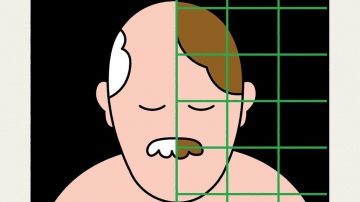Adam Gopnik in The New Yorker:
 The work of the AgeLab is shaped by a paradox. Having been established to engineer and promote new products and services specially designed for the expanding market of the aged, the AgeLab swiftly discovered that engineering and promoting new products and services specially designed for the expanding market of the aged is a good way of going out of business. Old people will not buy anything that reminds them that they are old. They are a market that cannot be marketed to. In effect, to accept help in getting out of the suit is to accept that we’re in the suit for life. We would rather suffer because we’re old than accept that we’re old and suffer less.
The work of the AgeLab is shaped by a paradox. Having been established to engineer and promote new products and services specially designed for the expanding market of the aged, the AgeLab swiftly discovered that engineering and promoting new products and services specially designed for the expanding market of the aged is a good way of going out of business. Old people will not buy anything that reminds them that they are old. They are a market that cannot be marketed to. In effect, to accept help in getting out of the suit is to accept that we’re in the suit for life. We would rather suffer because we’re old than accept that we’re old and suffer less.
This paradox is, well, old. Heinz, back in the nineteen-fifties, tried marketing a line of “Senior Foods” that was, essentially, baby food for old people. It not only failed spectacularly but, as Coughlin puts it, poisoned an entire category. The most perverse of these failures is perhaps that of the pers, or personal-emergency-response system, a category of device—best known for the hysterically toned television ad in which an elderly woman calls out, “I’ve fallen and I can’t get up!”—designed as a neck pendant that summons emergency services when pressed. It is simple and effective. “The problem is that no one wants one,” Coughlin says. “The entire penetration in the U.S. of the sixty-five-plus market is less than four per cent. And a German study showed that, when subscribers fell and remained on the floor for longer than five minutes, they failed to use their devices to summon help eighty-three per cent of the time.” In other words, many older people would sooner thrash on the floor in distress than press a button—one that may summon assistance but whose real impact is to admit, I am old.
More here.
